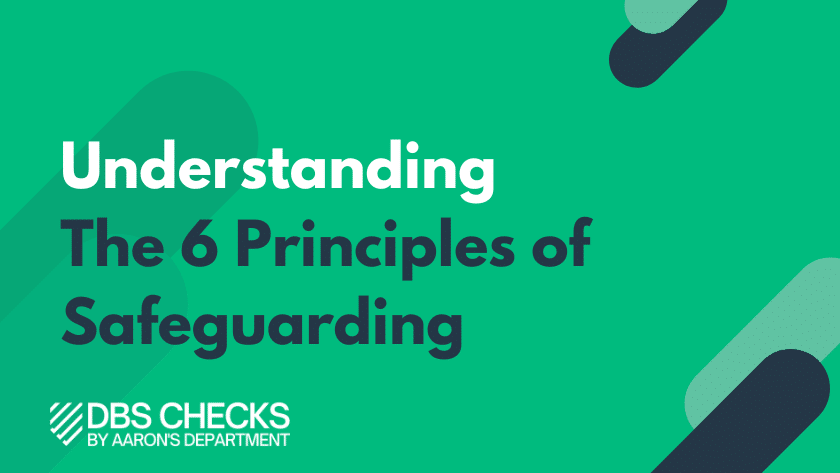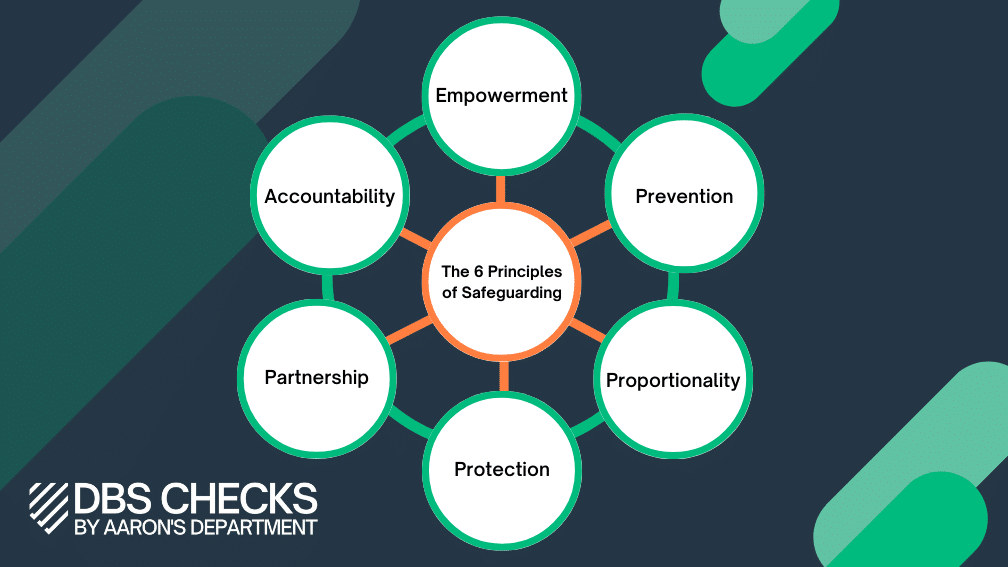What Are The 6 Principles of Safeguarding?
The 6 Principles of Safeguarding refers to the measures and practices put in place to protect children and Vulnerable Adults from harm, abuse, neglect, and exploitation.
Understanding the 6 principles of safeguarding and what they are is an important part of keeping children and Vulnerable Adults safe from harm, neglect and abuse.
The 6 Principles of Safeguarding are
- Empowerment
- Prevention
- Proportionality
- Protection
- Partnership
- Accountability
Whether it is within healthcare, education, social services, or any other sector, the 6 Principles of Safeguarding help maintain a secure environment for everyone.


The 6 Principles Of Safeguarding
- Empowerment
Empowerment is the first of the 6 Principles of Safeguarding, emphasising the importance of supporting individuals to make their own choices and have control over their lives.
This principle recognises that everyone has the right to be involved in decisions that affect them, regardless of their age, ability, or background.
- Prevention
Prevention is a proactive principle that involves taking steps to avoid harm and abuse before they occur, recognising the significance of identifying potential risks and implementing measures to mitigate them. This could involve creating policies, procedures, and training programmes that educate staff members and the community about safeguarding issues.
By fostering a culture of prevention, you can reduce the likelihood of harm and promote awareness and vigilance in recognising and addressing suspicious activities.
- Proportionality
The principle of proportionality emphasises that the response to safeguarding concerns should be proportional to the level of risk involved. This means that interventions should be tailored to the specific situation and not be overly intrusive or restrictive.
This principle guards against an excessive or unjust response, which could inadvertently harm an individual’s rights or well-being.
- Protection
Protection is at the core of safeguarding. Under this principle, organisations and individuals should understand safeguarding processes and best practice. They will need to know what to do if a safeguarding concern arises, how to stop hazards from occurring or escalating, and how to provide help and support to the vulnerable person who requires it.
- Partnership
Safeguarding is not something that is done alone, instead it is an effort that involves everyone, highlighting the importance of working together to ensure the safety and well-being of vulnerable individuals.
This approach facilitates an understanding of safeguarding concerns and allows for a more comprehensive response that addresses various aspects of a vulnerable individual’s life.
- Accountability
The final Principle of Safeguarding, accountability, emphasises the responsibility of organisations and individuals to be answerable for their actions. Maintaining transparent processes, clear lines of responsibility, and robust reporting mechanisms to ensure that safeguarding concerns are addressed promptly and effectively is critical.
This final principle of the 6 Principles of Safeguarding not only ensures that appropriate action is taken, but also fosters trust within organisations by demonstrating the department’s commitment to safeguarding.


Conclusion – The 6 Principles Of Safeguarding
In conclusion, The 6 Principles of Safeguarding are crucial for the same reason that safeguarding matters – because everyone deserves to live free from abuse and neglect. These principles show us how to achieve this by:
- Helping vulnerable people make choices.
- Stopping harm quickly.
- Dealing with risks in the right way.
- Teaching people to prevent abuse.
- Working with others to support vulnerable people.
- Making sure everyone knows how to keep others safe.
Following these principles prevents abuse and ensures a high standard of care for children and vulnerable adults. By using them, we do our best to protect vulnerable people from harm.
Aaron’s Department can help you to implement the 6 Principles of Safeguarding.
Aaron’s Department provides Basic DBS checks, Standard DBS checks, Enhanced DBS checks, Enhanced DBS Checks with Barred List information and Adult First checks.
We also offer an Automatic Update Service – an online subscription that informs you when there have been any changes to an employee’s record.
We have created an efficient online system that allows us to provide you with a very fast, yet cost-effective service.
Registration is free, there is no sign-up fee, and our support team are here to guide you through the process if necessary, answering any questions you might have about completing a DBS check.
For more information, call on 0113 877 0171, email us at contact@aaronsdepartment.com, or you can register below.
Further Reading
If you have found our article useful, why not read one of our other informative articles below.
5 Reasons Why Safeguarding Is Important
About The Author


Kellie Dawson
Kellie is our in-house legal expert when it comes to DBS checks. With a background in the legal sector, she has become a recognised authority in this area.

